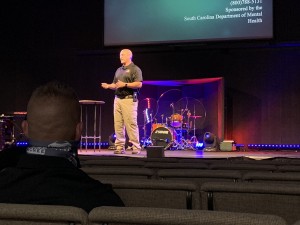Training Provides Oconee County Sheriff’s Office Deputies with Tools to Aid Citizens with Mental Health Conditions

For former Greenville City Police Department Captain Marty Wilkes, his involvement with CIT (Crisis Intervention Training) training stemmed from training that he personally received years ago.
One year ago, Marty retired after 25 years with the Greenville PD. For most of his career, Marty was an investigator and then worked in the support division and was over operations. He is still involved in law enforcement work, working special events part time with Greenville PD as a special duty officer.
However, while at Greenville PD, Marty participated in a week long, 35-hour Crisis Intervention Training. Marty said that the 35-hour training is a community based approach involving those from the mental health field and local and state partners as well. Near the end of the 35-hour training, members of the community that may have been diagnosed with a mental health disease speak to those in attendance as well, sharing their stories. When the end of the week comes, those in attendance are given training in verbal intervention and de-escalation as well as a time for role playing scenarios for application purposes.
Marty’s training not only helped him to serve the citizens of Greenville when he was a full time officer, but it also led him on a new career path after his retirement. The career path Marty chose allows him to help train officers in Crisis Intervention Training, using the techniques and tools that he has learned.
“I realized how important the training was at the time and when I retired, this position with NAMI (National Alliance on Mental Illness) of South Carolina came open as the Upstate Regional Coordinator,” according to Marty. “When it was brought to my attention, I jumped at the opportunity because I thought it would be great for me to be able to provide this information and knowledge for officers out here to help them have tools to do their job better.”
Recently, Marty taught Crisis Intervention Training to the deputies from the Oconee County Sheriff’s Office. The training that Marty taught is a requirement for law enforcement officers in order to maintain their accreditation from the South Carolina Criminal Justice Academy.
The Crisis Intervention Training that deputies from the Oconee County Sheriff’s Office participated in had two basic components. First, the training discusses the types of mental health and other cognitive impairments and symptoms. Second, the training then discusses techniques law enforcement officers can use to de-escalate those they come in contact with that may be displaying mental health or other cognitive impairments and symptoms in the hopes of bringing those situations to a peaceful end. In lieu of the role playing part of the 40-hour training, Marty used video’s to show officers how verbal intervention and de-escalation training works to help bring a peaceful and safe outcomes to these particular calls for service. The training lasted for two hours.
“The two hour training really summarizes the week long training. You get a little background on CIT training: what it is, why it is so important to de-escalate these situations,” according to Marty. “What we are trying to do is to divert individuals suffering from mental illness into a treatment program and away from the criminal justice system. So, we lay out that background. We go into the most common mental illnesses and disorders that the officer may encounter while on the street and then we give them the verbal intervention and non-verbal interventions to de-escalate those situations successfully.”
And while the accreditation piece is important for law enforcement officers, it is the tools and tactics that officers learn to help bring these calls for service to a peaceful conclusion that makes Crisis Intervention Training so crucial. As Oconee County Sheriff Mike Crenshaw see it, it is tools and tactics that deputies can use in a variety of situations, not just calls involving those who are suffering from a mental illness.
“Training plays a vital role when it comes to the quality of service provided by law enforcement,” says Oconee County Sheriff Mike Crenshaw. “My Office is committed to providing needed equipment along with advanced training to allow our deputies to provide quality service regardless of the circumstances. Each deputy receiving this mental health related training is another opportunity to help our citizens, with techniques that can be adapted to a multitude of situations and calls for service in the hopes of bringing about a safe and successful resolution for all involved.”
